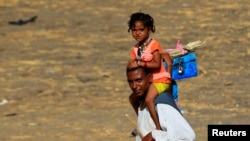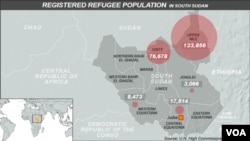GENEVA —
The United Nations refugee agency says tens of thousands of South Sudanese have fled their homes since the government and rebel forces signed a truce agreement almost three weeks ago. The UNHCR says people are fleeing continued fighting and the fear of not having enough food.
This is the second truce signed by the warring factions since fighting in South Sudan broke out in mid-December, like the first it is proving to have a very short life.
The U.N. refugee agency reports that in barely three weeks, escalating fighting between the government and rebels has caused 46,000 more people to flee, bringing South Sudan's internally displaced to more than one million.
More than 20,000 people also fled to neighboring Ethiopia, Kenya, Sudan and Uganda, swelling the refugee numbers to 370,000. UNHCR spokesman Adrian Edwards says Ethiopia is hosting more than 131,000. Most are women and children.
“Recent arrivals say they have fled fighting in neighbouring Jonglei and Upper Nile states, particularly the areas around Mathiang in Longechuk County in Upper Nile State," said Edwards. "Those from other areas said they feared imminent attacks or food insecurity.”
Edwards says Ethiopia cannot keep up with the swarm of people arriving. He says an average of 1,000 South Sudanese arrive each day and three refugee camps that opened this year are overflowing.
He says the UNHCR and Ethiopian authorities are looking for land to erect a fourth camp.
The UNHCR also cares for some 320,000 refugees from Sudan who are sheltering in the Maban area of Upper Nile in South Sudan. It estimates some four million people face severe food shortages in the country. Because of the fighting, Edwards says many people are unable to farm, depriving them of normal food sources.
“We are worried about the food situation and the impact that might have on further displacement," he said. "But clearly, at the moment, the fundamental cause is insecurity. I think that is probably the most immediate of worries. That is not to downplay the food insecurity risk at all. But it is just to say, without better security the risks in all areas will continue to grow.”
Despite the fighting, the World Food Program reports it distributed food to more than one million people last month across South Sudan.
Looking ahead, the U.N. refugee agency says it fears many people will not be able to flee areas of conflict because the rainy season will make roads and river crossings impassable.
This is the second truce signed by the warring factions since fighting in South Sudan broke out in mid-December, like the first it is proving to have a very short life.
The U.N. refugee agency reports that in barely three weeks, escalating fighting between the government and rebels has caused 46,000 more people to flee, bringing South Sudan's internally displaced to more than one million.
More than 20,000 people also fled to neighboring Ethiopia, Kenya, Sudan and Uganda, swelling the refugee numbers to 370,000. UNHCR spokesman Adrian Edwards says Ethiopia is hosting more than 131,000. Most are women and children.
“Recent arrivals say they have fled fighting in neighbouring Jonglei and Upper Nile states, particularly the areas around Mathiang in Longechuk County in Upper Nile State," said Edwards. "Those from other areas said they feared imminent attacks or food insecurity.”
Edwards says Ethiopia cannot keep up with the swarm of people arriving. He says an average of 1,000 South Sudanese arrive each day and three refugee camps that opened this year are overflowing.
He says the UNHCR and Ethiopian authorities are looking for land to erect a fourth camp.
The UNHCR also cares for some 320,000 refugees from Sudan who are sheltering in the Maban area of Upper Nile in South Sudan. It estimates some four million people face severe food shortages in the country. Because of the fighting, Edwards says many people are unable to farm, depriving them of normal food sources.
“We are worried about the food situation and the impact that might have on further displacement," he said. "But clearly, at the moment, the fundamental cause is insecurity. I think that is probably the most immediate of worries. That is not to downplay the food insecurity risk at all. But it is just to say, without better security the risks in all areas will continue to grow.”
Despite the fighting, the World Food Program reports it distributed food to more than one million people last month across South Sudan.
Looking ahead, the U.N. refugee agency says it fears many people will not be able to flee areas of conflict because the rainy season will make roads and river crossings impassable.





